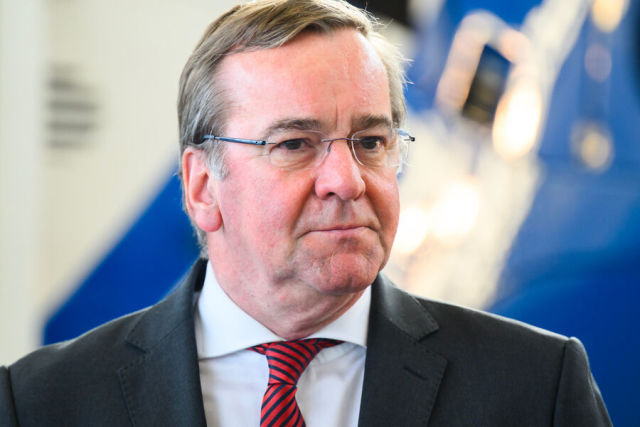The German Defense Minister predicted "decisive moments" for Ukraine and called for the creation of air defense The coming weeks will be "very decisive" for Ukraine, according to German Defense Minister Boris Pistorius.
According to him, in the near future, the Armed Forces of Ukraine will repel the Russian offensive. President of Ukraine Volodymyr Zelensky said earlier that the military conflict could not last for years. At the same time, military analyst Michael Kofman doubts that the spring offensive will take place - and the Russian Armed Forces have been advancing for three weeks in different directions. Russian expert Yuri Knutov said that it is hardly necessary to wait for a massive Russian offensive, and the Pentagon is waiting for the APU to go on the counteroffensive. "Newspaper.Ru" studied forecasts.
Pistorius on the future
German Defense Minister Boris Pistorius said that Ukraine should experience "very decisive" moments in the next few weeks. His words are reported by Bloomberg.
He noted that Kiev "will have to repel the Russian offensive."
Earlier, Pistorius also reported that the Leopard 2 main battle tanks will be able to deliver the APU only in the middle of spring.
"We can deliver at least one battalion [of 31 tanks] in the first four months of this year - maybe three months - and then, of course, we need to act as quickly as possible," the official told Reuters.
Will there be an offensive
The armed conflict in Ukraine will not be able to continue for years in the modern world. This opinion was expressed in an interview with the Italian newspaper Il Mondo by Ukrainian President Vladimir Zelensky.
Head of the Russia Research Program at the American Naval Analytical Center (Center For Naval Analyses, CNA) Michael Kofman on his Twitter the day before outlined his thoughts on the current course of military operations in Ukraine.
According to him, the Russian offensive has allegedly been going on for three weeks in a row, but it has not brought significant success. The Russian Armed Forces are advancing simultaneously on Bakhmut, Ugledar, Marinka and Avdiivka, the analyst said. The Russian troops began to advance with a massive attack by the forces of two brigades in the Ugledar direction at the end of January, Kofman added.
At the same time, he pointed out that the vicinity of Ugledar is an "extremely open area" with a huge number of mines, easily shot through by anti-tank weapons.
Kofman noted that the AFU could very likely retreat from Bakhmut (Artemovsk) to a new defensive line - to the east of Slavyansk and Kramatorsk. At the same time, the Russian military may then try to take control of the territory up to the Donets River.
The expert also points out that positional battles have been going on for several months in the Avdiivka and Maryinsk directions.
He also pointed out that any military actions in the current situation entail a very large expenditure of ammunition and other resources, including armored vehicles on both sides.
"This remains a problem in the near and medium term. Rosy estimates of the potential of Western ammunition production in the long term may not coincide with the needs of the Armed Forces for the next 6-12 months," said Michael Kofman.
Finally, he suggested that the spring offensive could already be undertaken by Ukrainian troops "following the example of Kherson."
"Whether Western supplies will be of great importance depends on the time of the APU offensive. Perhaps this technique will mainly serve to make up for losses in the next operation," summed up a military expert from the United States.
On February 19, military expert Yuri Knutov, in an interview with MK, said that in the near future, the Russian Aerospace Forces will begin striking bridges, tunnels and logistics hubs on the border with Poland, which are used by the Armed Forces of Ukraine. According to Knutov,
The expert stressed that in this way the Russian army will be able to disrupt the offensive, which the APU allegedly plans to launch in the spring.
"The enemy is actively mobilizing, preparing armored vehicles, primarily tanks, to participate in combat operations. Ammunition is also being actively supplied to Ukraine under the cover of a story about a shell famine," Knutov said.
On February 14, US Secretary of Defense Lloyd Austin said that the AFU could attempt a counteroffensive in the spring.
On January 4, the head of intelligence of Ukraine, Kirill Budanov, said that in the spring of 2023, the Armed Forces of Ukraine intend to go on the offensive. He added that the peak of hostilities will be in March, after which "from Crimea to Donbass" Ukrainian troops will go on the offensive. Budanov pointed out that Kiev's goal is to reach the borders of 1991.
On December 21, Russian President Vladimir Putin expressed confidence that the goals in the military sphere are achievable. "I have no doubt that all the goals that we set for ourselves will certainly be achieved," Putin stressed. Russian Defense Minister Sergei Shoigu said that the priority task in 2023 will be to continue the special operation "until the tasks are fully completed."
Soon Putin added that Russia's main goal is "to protect people who consider themselves part of the Russian people and culture," as well as to stop full-scale hostilities in the Donbass.
Ivan Zhukovsky

